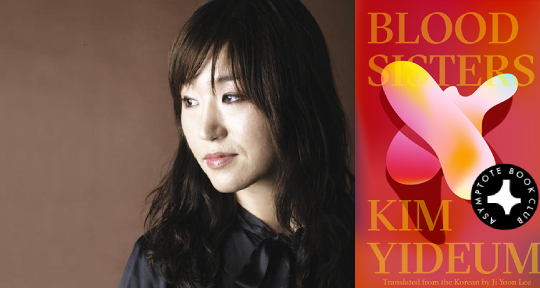“A female writer needs to fight to build her own language against the default system,” says Kim Yi-deum. “[She] writes with the language of her body—her womb, tits, tears, blood.”
Those lines give a taste of the combative nature of Blood Sisters, Kim Yi-deum’s debut novel (she is perhaps best known as the author of five poetry collections, selections from which have previously appeared in Asymptote, translated by Ji Yoon Lee). The novel’s protagonist, Jeong Yeoul, is forced to struggle in a country rocked by the fallout from the Gwangju Massacre in May 1980. “Trauma,” writes our reviewer, “permeates the pages of Blood Sisters.”
In Ji Yoon Lee’s English translation, Blood Sisters becomes the first Korean title to be selected by the Asymptote Book Club. You can view all our previous titles and sign up for forthcoming selections via our website, or join the online discussion on our Facebook page.
Blood Sisters by Kim Yideum, translated from the Korean by Ji Yoon Lee, Deep Vellum (2019)
Reviewed by Alyea Canada, Assistant Editor
In a recent interview with The Margins, Kim Yideum said, “Humans talk as if there is something grand in all things. But I don’t believe that. I don’t like things that are so ideological.” It is perhaps best to approach Yideum’s Blood Sisters with this sentiment in mind because it is a book which resists simple summation and emotional reveals. Its protagonist, Jeong Yeoul, is a young college student trying to make her way in a Korea rocked by the violent suppression of student demonstrations in the 1980s.
Yideum is primarily a poet and this is evident in the texture and sensuality of her prose, skillfully translated by Ji Yoon Lee. “My flesh crumbles into tiny flakes. I love that I can’t see myself—there is no anger, no grudge, just darkness here.” Such sentences are comfortably juxtaposed to the coarse way Yeoul speaks and describes the world around her. Yideum expertly depicts a world in which female pain is casually cast aside—a world that will be all too familiar to many female readers. The men in this novel do not fare well. They are almost exclusively violent, manipulative, or childlike. In such an environment, where men will inevitably be violent and women are expected to forgive and forget, it is no surprise that female friendships anchor Yeoul.
Curiously, though, few pages are devoted to the development of the relationships between female characters. The friendship which suffered the most from this omission is that between Yeoul and Sol, which is especially odd given the weight it carries in the final act.
Trauma permeates the pages of Blood Sisters. Yeoul loses the two people she loves most in the course of a year, is estranged from her family, and survives a violent attack. As a result, she lives a “disposable instant life” where “there is no past, no future; there is no previous life or reincarnation; there is no eternity. Just one disposable day after another.” Somewhere in the infinite iterations of the universe, there is a version of Blood Sisters where Yeoul’s story demonstrates the resilience of the human spirit, one where an emotional flashback reveals the circumstances of her brother’s death or the discovery of a lost diary explains a friend’s suicide, but that version is not this book. Instead we are left with a young woman struggling to find her footing and half-heartedly searching for a direction in a society that also could follow myriad paths. There is something comforting in the contradictions Yeoul embodies and how real she feels. She claims to be apolitical yet builds deep connections with activists during a time of revolution. She is someone who rails against conservative sexual mores while also seeking comfort in them. Yeoul is a human and not an allegory.
Blood Sisters is certainly not for everyone, but it resonates with a tension that feels especially prescient. In times of political and social upheaval, when everyone seems determined to attach political significance to everything, is it radical to live one day at a time or is it a failure? Blood Sisters won’t answer this for you, but it will make you wonder if there should even be an answer: in the end, Yideum suggests, there is no grand meaning to individual actions.
Alyea Canada is an Assistant Editor at Asymptote. She currently works as a freelance editor and lives in Brooklyn, New York.
****
Read about more Asymptote Book Club titles here:

